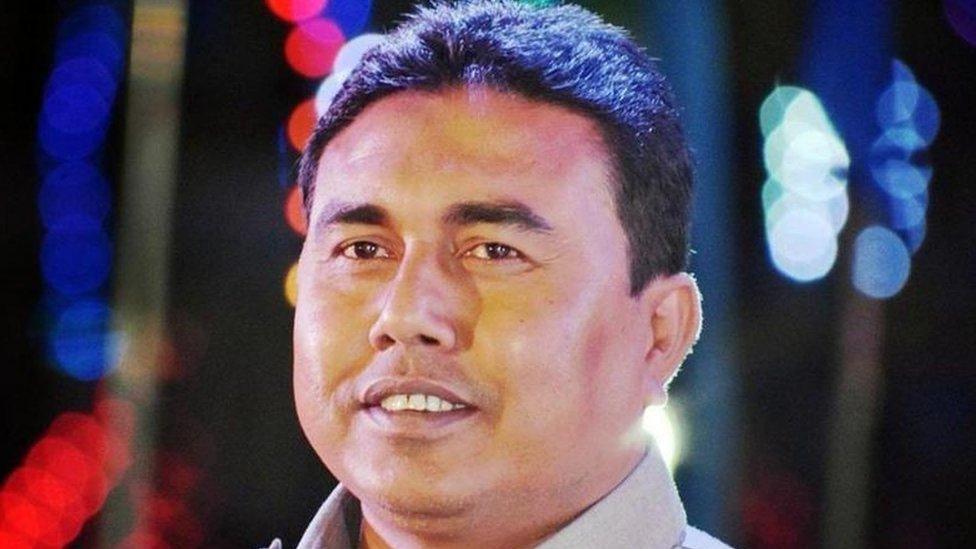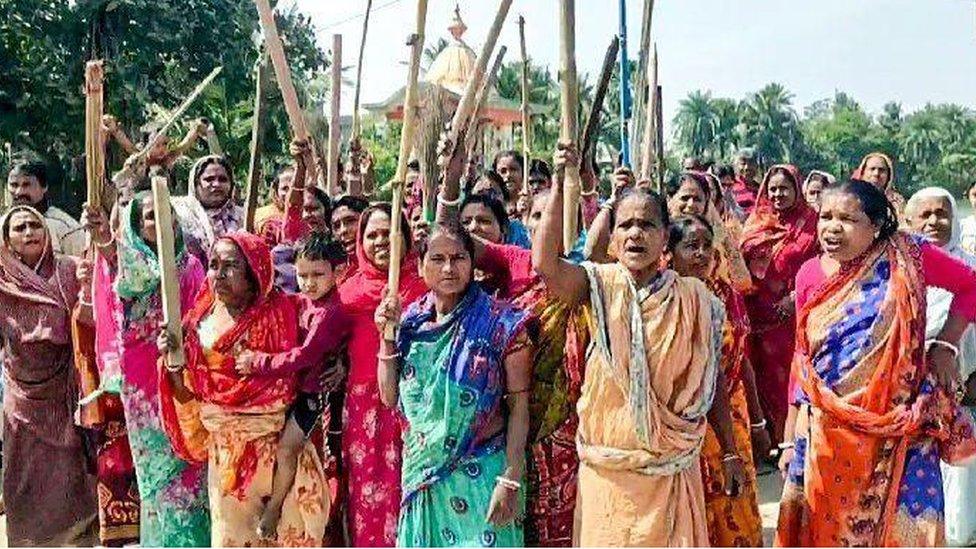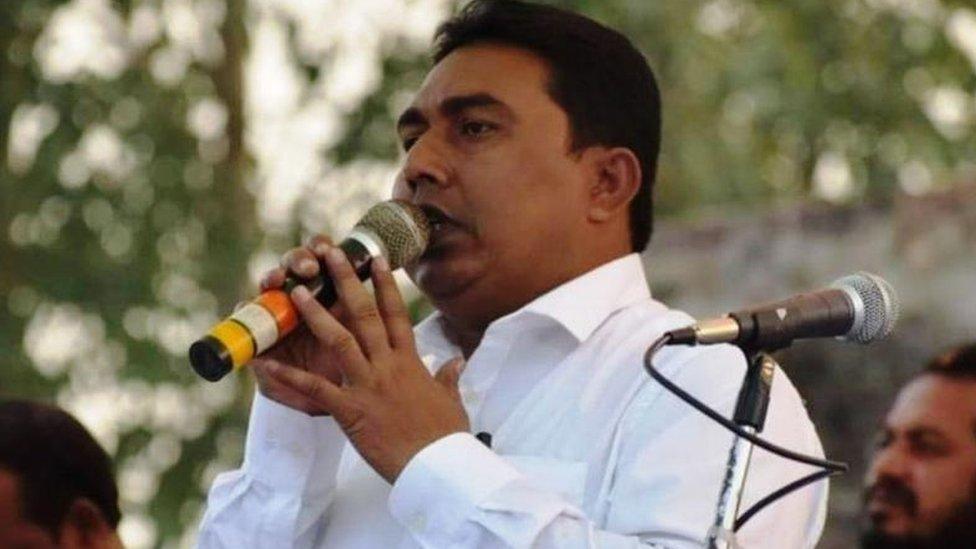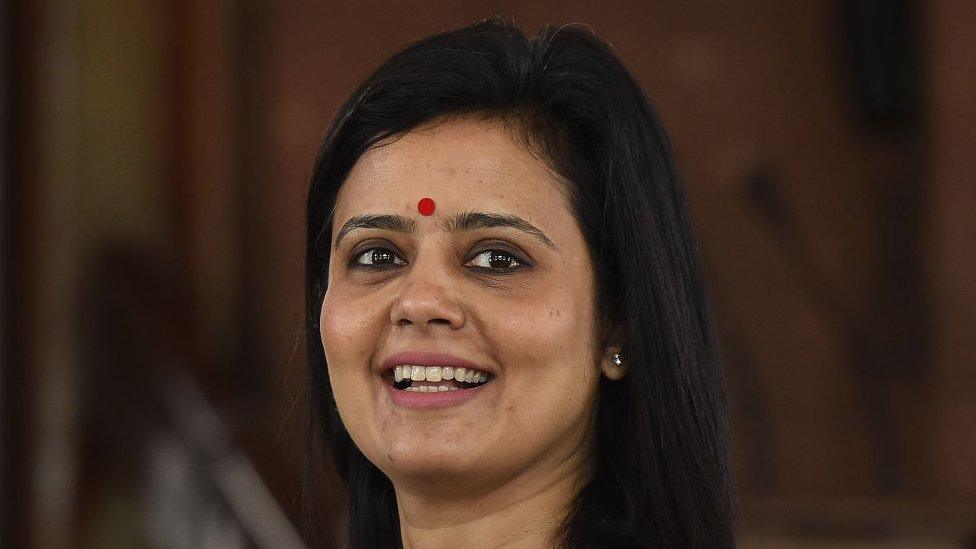Sandeshkhali: West Bengal village in the eye of a political storm
- Published

Shahjahan Sheikh, a local politician in Sandeshkhali, was arrested on Thursday
Since January, a small Indian island near the Bangladesh border has been in the spotlight after a political storm broke out over allegations of corruption and sexual assault against a local leader. After almost two months of being on the run, Shahjahan Sheikh was arrested on Thursday morning.
Until the controversy, millions of Indians had never heard of Sandeshkhali in West Bengal state. Now, the village is regularly in the headlines as national political leaders make a beeline to it.
Locals in Sandeshkhali have accused Mr Sheikh, a member of the state's Trinamool Congress party (TMC), and other local politicians of illegally seizing their lands and sexually assaulting several women in the area.
Protests demanding their arrests have been raging for more than 50 days. At least two women have also lodged complaints with the police, magistrate and the women's commission alleging they were raped by the same men.
Two of Mr Sheikh's aides - Shibaprasad Hazra and Uttam Sardar - were arrested earlier this month on charges of gang rape, sexual assault and attempt to murder. They deny the allegations.
The case has dominated headlines in India for weeks and has sparked a political storm, with two heavyweights - Indian Prime Minister Narendra Modi's Bharatiya Janata Party (BJP) and firebrand West Bengal Chief Minister Mamata Banerjee's TMC - locking horns over the allegations.
While the BJP accuses the TMC of delaying Mr Sheikh's arrest despite his alleged excesses, the TMC denies this and accuses Mr Modi's party of stirring tensions in the island, months ahead of the general elections. Both the parties claim their tug of war is to ensure the wellbeing of Sandeshkhali residents.
Mr Modi is also expected to visit the state later this week and address a rally in North 24 Parganas district, where Sandeshkhali is located.

Women of Sandeshkhali accuse Mr Sheikh and other politicians of sexual assault and land grab
What happened?
Protests against Mr Sheikh began in January when India's financial crimes agency, the Enforcement Directorate (ED), attempted to question him in connection with corruption allegations.
The case involves another TMC leader Jyotipriya Mallick. A former state minister, he was arrested in October for allegedly diverting funds of the public food distribution system or rationing networks to private parties. Mr Mallick denies the allegations, calling his arrest a "political conspiracy".
According to the ED, Mr Sheikh who is the leader of a small administrative block in Sandeshkhali, was allegedly a close associate of Mr Mallick.
When ED officials and paramilitary personnel raided Mr Sheikh's home on 5 January, his supporters gathered there and allegedly attacked them to prevent his arrest. Mr Sheikh escaped in the melee which ensued.
With Mr Sheikh gone from the village, a few women gathered to protest against him for "terrorising" them over the past decade.
While the agitation made some news, it died down eventually - until it resurfaced in February with renewed vigour.
This time, several women came out and accused Mr Sheikh and his supporters of allegedly molesting them.
The leaders would "summon good looking women at odd hours at night" to the TMC office, the women alleged, adding that men in their families were allegedly beaten up "if they refused to do the bidding" of Mr Sheikh and his supporters.
BBC Bangla spoke to several women who reiterated the charges, even though they did not identify any survivors of the alleged sexual assault.
Villagers have also accused Mr Sheikh of amassing huge wealth - including three houses, commercial fish ponds, and large swathes of land - by illegally encroaching land owned by them.
Since the allegations came to the fore, several villagers in Sandeshkhali have reportedly reclaimed their properties after the West Bengal government started the process of returning their land to them.
Mr Sheikh has not commented on the charges as he had been "absconding" until his arrest, according to the police. But his aides Mr Hazra and Mr Sardar have denied the allegations.

Mr Sheikh was on the run for 50 days before he was arrested
But who is Shahjahan Sheikh?
Mr Sheikh is a village-level leader of the district's fisheries and animal husbandry department.
Reports say he worked as a helper in the local fisheries and later became a supporter of Communist Party of India (Marxist), or CPI (M), which was in power in the state a decade ago.
With the help of an uncle, who was a village leader of the CPI(M), Mr Sheikh reportedly built his clout in the party for years, before he joined the TMC in 2013.
TMC leaders claim that his area of influence has been confined to Sandeshkhali where he is known as a businessman who rose from humble beginnings.
"During the past decade not a single person complained against him or his aides. How can that be if he was guilty?" TMC spokesperson Arup Chakraborty told BBC Bangla.
Mr Chakraborty alleged that "communal forces" were trying to create unrest in the state ahead of the elections.
But the BJP, which has been at the forefront of protests against Mr Sheikh, has been asking how he could avoid arrest if he did not have clout in the state's ruling party.
As Sandeshkhali remains a political flashpoint, even the communist parties have staged protests against the TMC for allegedly continuing to support Mr Sheikh.
Several villagers whom BBC Bangla spoke too said they felt "wronged by their own party".

Read more India stories from the BBC:

Related topics
- Published27 October 2023

- Published2 February 2024